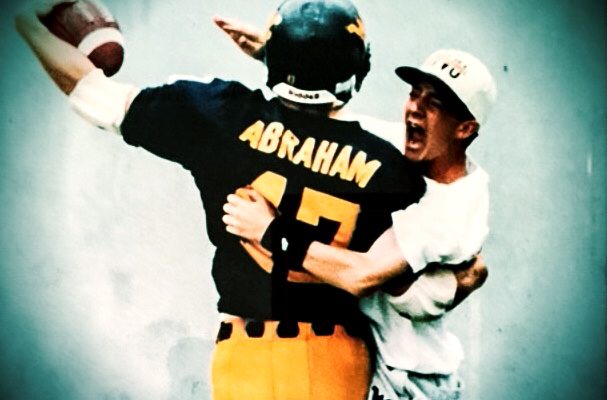No matter where he has traveled in the state of West Virginia since, people still recall “The Catch” on Oct. 15 at old Pitt Stadium during the 1994 “Backyard Brawl.”
Only twenty-four seconds remained on the clock, and WVU was down a point to the one-win Panthers; the line of scrimmage was the Mountaineers’ 40-yard line; number 47, Wheeling native Zach Abraham, was one of four wide receivers on the field and was lined up on the right side; quarterback Chad Johnston was behind center.
It was the 100th anniversary of this storied rivalry between WVU and Pittsburgh, and it was a game that included a pick-6, a fumble returned for a touchdown, a blocked punt, and three blocked field goals, two of which were returned for touchdowns. The Panthers, down 31-6 at one point, had rallied to take a 41-40 lead. It was third down with 10 yards to cover for at least a first down.
And that’s when a national television audience heard the play-by-play broadcaster exclaim, “He’s got it! He’s got it! TOUCHDOWN WEST VIRGINIA!”
Abraham, a West Virginia walk-on in 1991, hauled in Johnston’s pass over his left shoulder at the 10 yard line and continued his sprint into the end zone.
“We had the same play called for all four downs at that point in that game, and I was just four verticals, and that meant four receivers were getting down the field as fast as we could,” Abraham recalled. “We wanted to stretch the field a bit; we knew Chad (Johnston) could scramble pretty well, and all we needed was a field goal to win the game.
“So on the third time that’s when Chad popped it to me because he saw their DB (sophomore Denorse Mosley) hesitate, so he threw over top of him while he was scrambling. I saw the DB hesitate, too, and he and I had been battling the entire game. Rahsaan Vanterpool was my receiver mate, and between him and me we were just shy of 400 yards receiving that game. So we were beating up on those guys pretty good that game.”
Although Mosley seemed not to care about Johnston’s mobility on first and second down, the native of Pahokee, Fla., did on third and 10.
“The DB was coming up because he saw Chad scrambling again, and that’s how I got behind him. I was supposed to just keeping running,” Abraham said. “As soon as he hesitated, I looked back, and the ball was in the air. I remember thinking, ‘Oh. My. God. I’d better not drop this.’
“Instinctively, I caught the ball, but it all happened so quickly,” the former receiver continued. “It was one of those things. I just put my arms out, and I caught it. I just kept running, and after I scored, I didn’t know what to do with the ball. I was just shaking it like a rag doll, and I didn’t dare spike it. I don’t think it really hit me until all of my teammates ran over to me. Everything happened in that game. It was that crazy.”
Of course every media member covering the game wished to interview Abraham and a few of his teammates once the final 15 seconds ticked away, and after taking showers, he, David Mayfield, Rahsaan Vanterpool, and Chad Johnston exited the locker room.
“So we all came out of the locker room together, and our parents were out there waiting to see us. But we couldn’t find our bus,” Abraham said. “They had left us there. Talk about a humbling experience. So John Antonik was still there; he was the assistant sports information director at the time, and he got us back to Morgantown. Then on the following Monday, we told Doc Holiday, who was our receivers coach then, that he had left us at the game. He had no idea they left the four of us in Pittsburgh.”
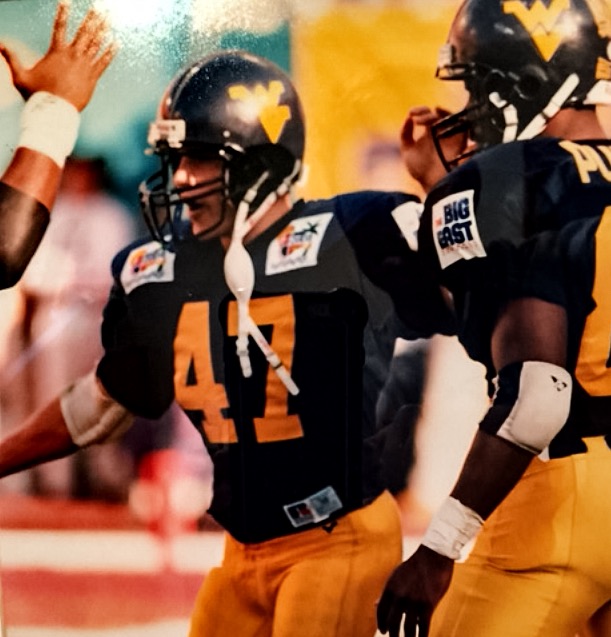
His Road to Morgantown
Abraham was named a Class AAA all-state first-teamer following his senior season at Wheeling Park High in 1990 and wished to further his career at the next level. “Where?”, though, was his mystery to solve. Keep in mind, too, the American public had yet to gain access to the World Wide Web.
“When I was in high school, we had to wait our turn when it came to playing time. I did play a lot of special teams my junior year, but it wasn’t until my senior year that I became a starter,” Abraham recalled. “That’s when things seemed to click, and we had a pretty good season. But at that time the college recruiting was a lot different than it is today because we didn’t have all of the technology that we have today.
“That’s when I spoke with Coach (Ron) White, and we sent some tapes down to WVU and a couple of other schools that I was interested in,” he continued. “The people at WVU told me that they would let me walk on if that’s what I wanted to do. I wasn’t an invited walk-on, though, so I didn’t go there in the fall 1990 but did go in the spring of 1991.”
So this headline-maker from Wheeling who helped lead the Patriots to an 8-2 record and to the postseason had to audition for head coach Don Nehlen and his staff.
“The way it worked then was I had to try out, and there were 43 of us with the same idea in mind,” Abraham said. “I was walking everywhere I wanted to go in Morgantown then because I didn’t have a car, and we were told to go back to the football facility two days later to see if my name was put up on the list. When I did that, I saw that there were three names on the list; a lineman, a linebacker, and me.
“That meant the three of us were allowed to come back and go into spring ball with the rest of the team, so that was one of the first hurdles that I had to overcome,” he continued. “They put the three of us plus about 20 others in a separate locker room, and at that time it was the visiting team’s locker room, so it wasn’t as nice as the one for the team.”
Abraham did attract the attention of the team’s star players but not because of his on-field performance.
“When it came time for the uniforms, the number they gave me was number 15,” he said. “But see, at that time number 15 belonged to another player by the name of James Jett, and that’s a player everyone knew because he was one of the best receivers in the country. So I guess my number was the backup 15. I’m still not sure about all of that.
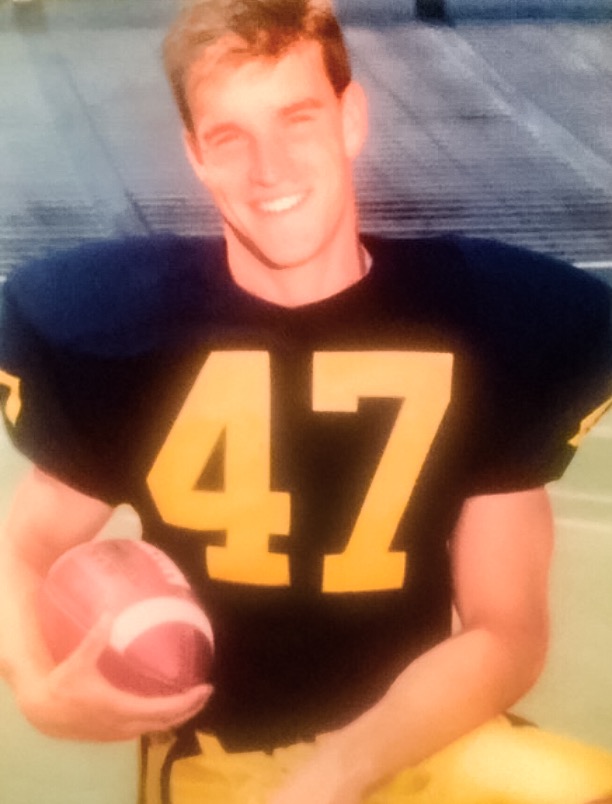
“I got heckled pretty good by my buddies because of that, and then James made a video of him saying, ‘Hell, my name is James Jett, and I don’t have any clue who that guy is,’” Abraham said with a laugh. “But then I was issued a different number, and I did end up playing on some special teams, and then a little later than that I won the Best-Conditioned Athlete award for the team, and I think that helped get me more involved.”
During his junior season Abraham and the Mountaineers capped off an undefeated regular season and a Big East Conference title in 1993 with a 17-14 victory over No. 11 Boston College, but in the Sugar Bowl WVU was soundly defeated by No. 8 Florida, 41-7. The receiver saw action in seven games, hauled in 10 catches, and scored one touchdown that year.
“All of the seniors who were mentors for me graduated, and that’s when a slot opened for me. It wasn’t a given, but I did pretty well with my conditioning, and I ended up starting my senior year,” Abraham said. “I had always been a Mountaineer fan growing up, but where I lived on the farm, we only got to watch occasionally because we only had an antenna on our TV, so it really depended if we could pick it up.
“We mostly listened to the games on the radio back then,” he continued. “But I was a Mountaineer fan as much as I could be, and it meant a lot to me to be on that football team even though I wasn’t awarded a scholarship until my junior year. That didn’t matter to me.”
Mayfield was gone, and so was quarterback Jake Kelchner. The Mountaineers were not ranked in the Association Press’ preseason polls, and after the team’s first five games WVU was 1-4 with a lone victory over non-conference Ball State. Nehlen’s team had been outscored 120-47 during that stretch, although Johnston, Vanterpool, and Abraham all returned to the roster for their senior seasons.
“There were a lot of disappointed fans because of the undefeated season the year before,” Abraham remembered. “But then we ended up winning five of our last seven games. When Jack Fleming did the highlight reel at the end of the year, he said it was a ‘tale of two teams’.
“We started that season against Nebraska in the Kickoff Classic, and we got crushed, 31-0. It was a tough way to start that season,” he continued. “But we got things together and ended up having a decent year (7-6) in 1994.”
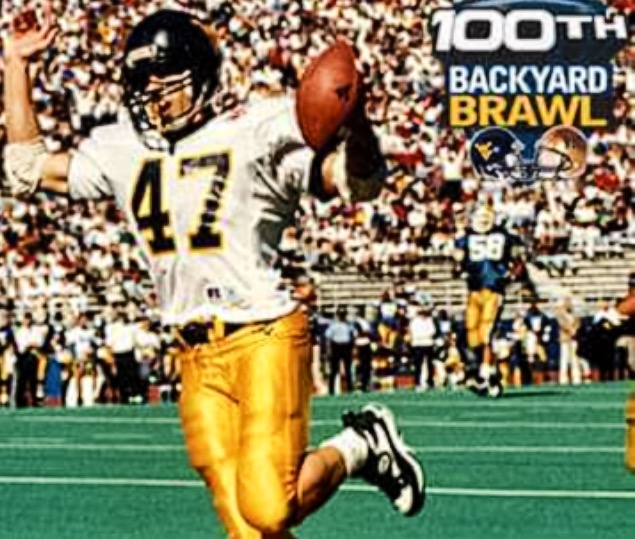
The History of Mountaineer Football
There have been 33 head coaches in the 125-year history of football at West Virginia University football, and through the 2015 season the Mountaineers compiled a 727-482-45 record while collecting 15 conferences titles. Prominent players who donned the blue and gold include Major Harris, Tavon Austin, Steve Slaton, Jeff Hostetler, Pat White, and Amos Zereoue; the program has had six coaches since 1970 in Bobby Bowden, Frank Cignetti Sr., Nehlen, Rich Rodriguez, Bill Stewart and current coach Dana Holgorsen.
Those 727 victories, by the way, are the 14th most among NCAA Division I programs never to claim a national championship.
“I think that’s really a cool thing,” Abraham said. “There’s been a lot of the history shared on Facebook recently, and it was really cool to see people share the video of that catch against Pitt. To see it in a digital format and be shared all over the Internet has been pretty neat.
“I know I’ll be going down for a couple of the games this season, and there is a roast for Coach Nehlen on Nov. 4, and that’s something I plan to attend,” he said. “And I have a lot of different Nehlen stories to share, but one of my favorites involved a conversation he and I had following a practice one day. It was during my sophomore year, and it was a Monday. After we had watched film until about 7:30 p.m., and as I am getting ready to leave the building, he asked me, ‘Zach, aren’t you going to come eat?’ And then I reminded him that, at that time, I wasn’t on scholarship, and so I wasn’t allowed.
“He paused for a moment, and then he took me into his office. As soon as I walked in I saw a bunch of produce behind his desk. There were cucumbers, corn, tomatoes, all different kinds of produce,” he added. “He asked me if I liked vegetables, and I told him I did, so he asked me if I wanted some. He told that he had this avid fan who didn’t donate money to the program, but he always delivered a lot of produce to him. That’s when he told me that because I wasn’t allowed to eat with the others players, he wanted to give me the produce to eat where I was living. And I didn’t have the heart to turn him down and even tell him that I was going to have to carry it all more than a mile to my apartment.”
But he did, and that’s because Nehlen’s kindness struck him as genuine yet unique.
“Here’s a coach who is revered by virtually everyone in the entire state and also by his peers from around the country, and then he cares enough about me to give me food. He knew there was a chance that I didn’t have any food. I had some at my place, but he didn’t know that.
“When I thought about it, I believe it was an example of that man’s character. He really did care about his players that way, and it wasn’t just about football with him,” he continued. “I was a nobody. I didn’t have a scholarship. I was working hard, but he didn’t have to treat me like that. That taught me a lot about leadership, too.”
During those 125 seasons the Mountaineers have suited up on the gridiron, WVU has battled against the Pitt Panthers and the likes of Tony Dorsett, Dan Marino, Rickey Jackson, Hugh Green, Mike Ditka, Larry Fitzgerald, Mark May, Bill Fralic, and Antonio Bryant. During the storied series both teams have upset the other, including WVU’s 19-16 victory when the Panthers were ranked eighth.
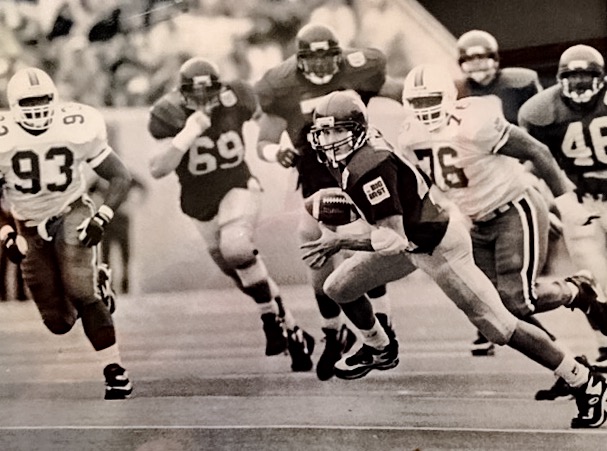
But it was on Dec. 1, 2007, with Rich Rodriguez at the helm, when Pitt destroyed WVU’s opportunity to play in the BCS National Championship. It was the 100th edition of the, “Backyard Brawl,” the Mountaineers were ranked second in the AP Poll, and the Panthers were just 4-7 and 28-point underdogs heading into Morgantown.
13-9.
It was West Virginia’s second loss of the season and no longer was the Superdome in New Orleans in the team’s sights. Rodriguez departed for the head coaching position at Michigan, and two weeks following the defeat by Pitt, New Martinsville native Bill Stewart was hired by then-athletics director Dan Pastilong, and then WVU whipped Oklahoma 48-28 in front of more than 70,000 fans and millions more on TV.
Five years later, though, the, “Backyard Brawl” vanished because West Virginia, via then-athletics director and former West Virginia quarterback Oliver Luck, opted to join the Big 12 Conference. The Mountaineers beat the Panthers in 2011, 21-20, and the 2012 season was the first since 1942 that did not include Pitt on the schedule.
“I didn’t like that the game was taken off the schedule, and I am glad to see that it’s coming back in 2022 (as a part of a four-year, home-and-home agreement that begins on Sept. 17 at Heinz Field). It was disheartening when that game went away because it had been a rivalry for both of the schools for more than 100 years,” said Abraham, who compiled a 3-1 record against Pitt during his career. “That’s what made it so important because there were so many teams before us that played that game.
“It was a chance for us, as players, to leave our mark and to be a part of that history,” he continued. “It meant something to us as players for a lot of different reasons, and one of them was because we knew how much it meant to the people of the state.”
Abraham certainly left an impression on the Mountaineer Nation. During his travels as one of the principal partners of AlignHR, LLC, and as the president of the Ohio County Board of Education, he is still recognized by those who recall “The Catch.”
“Oddly enough, they do still come up to me and bring up that game in particular. I don’t know what it is or why, but people have surprised me by walking up to me and asking if I played football for West Virginia,” Abraham explained. “I have been in different parts of the state, and when they have asked, I’ve told them that I did. And then they usually ask, ‘Are you the one who caught that ball against Pitt?’ And I’ve told them that yup; that was me.
“The only reason for that, I think, is because of how important that game against Pitt was each year, and not just to the members of the team but to the people all over West Virginia. There were a lot of emotions when it came to that game, and I can tell you that Coach Nehlen couldn’t stand Pitt,” he admitted. “There was a lot of tension that week of practice every year because Pitt was our last remaining rival on our schedule because the Penn State game had gone away a few years before that. It didn’t really matter what we did the rest of the season to a lot of people just as long as we beat Pitt.”
(Photos provided by Zach Abraham)

